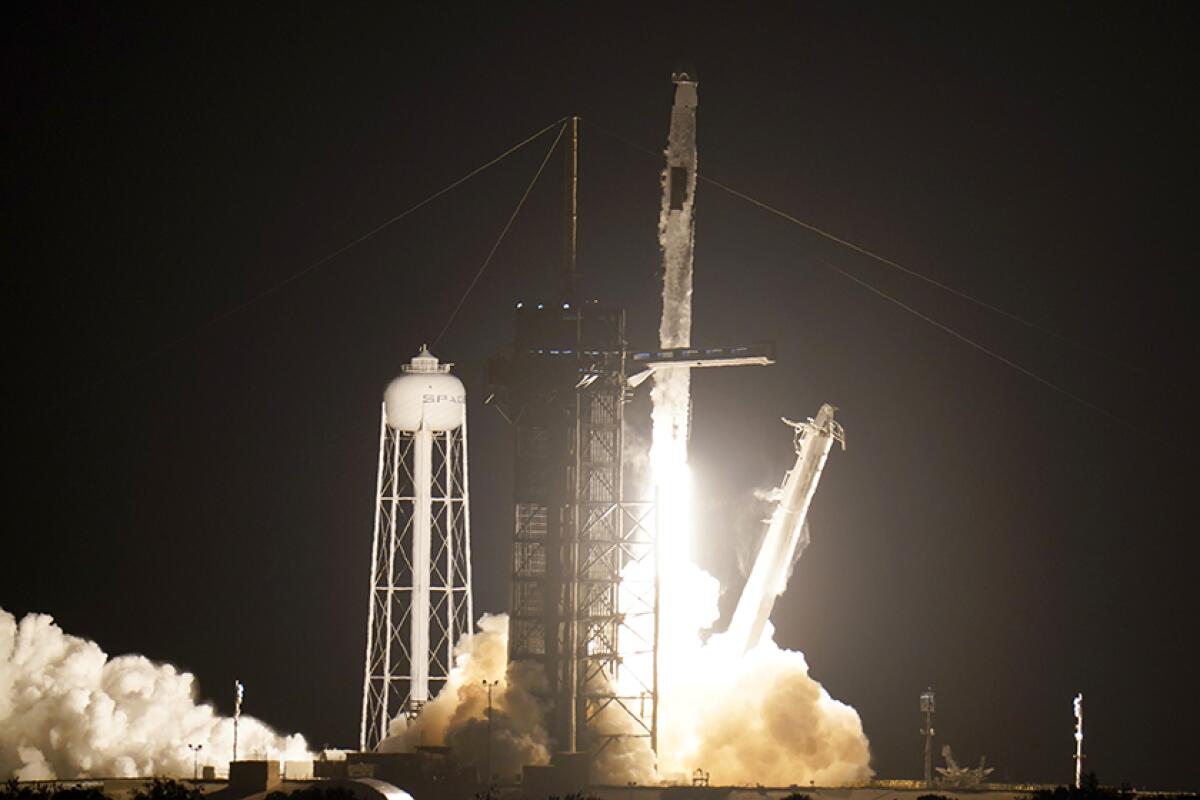What to know about Elon Musk’s contracts with the federal government

- Share via
- Billionaire Elon Musk, who runs six companies, will have to navigate potential conflicts of interest as he co-leads an effort to cut U.S. government spending.
- Musk’s SpaceX has received billions of dollars in federal contracts, while several of his companies face regulatory scrutiny.
Elon Musk is easily the world’s wealthiest man, with a net worth topping $300 billion.
But even he stands to make more money from his association with the federal government after placing a winning bet on Donald Trump’s election to the presidency.
“It’s going to be a golden era for Musk with Trump in the White House,” Wedbush Securities analyst Dan Ives said.
Musk’s aerospace company SpaceX has received billions of dollars in federal contracts, and could be line for more, while his five other businesses could gain from a lighter regulatory touch.
Trump has named Musk to co-head a new Department of Government Efficiency,” or DOGE — a nod to the cryptocurrency Musk adores. However, federal law bars executive branch employees, which can include unpaid consultants from participating in government matters that will affect their financial interests, unless they divest of their interests or recuse themselves.
Elon Musk’s announcement that he’s moving SpaceX headquarters to Texas could present a blow to Hawthorne and the Southern California space economy that it helped to revive.
Trump’s transition team has sought a work-around, saying he would “provide advice and guidance from outside of Government” with the work concluding by July 2026, according to a news release.
Richard Painter, a University of Minnesota Law School professor and former chief White House ethics lawyer, said that if Musk is truly working outside the government he doesn’t have to sell his assets, but that limits his influence.
“He can make recommendations, but ultimately the decisions are made by government officials,” Painter said.
Trump’s campaign and Musk’s companies didn’t respond to requests for comment.
Here’s how Musk could benefit from Trump’s presidency:
SpaceX
If there’s one Musk business that could profit the most from the incoming Trump administration, it’s SpaceX.
The company, which announced this year it was moving its headquarters from Hawthorne to Texas, already has received at least $21 billion in federal funds since its 2002 founding, according to government contracting research firm The Pulse. That includes contracts for launching military satellites, servicing the International Space Station and building a lunar lander.
However, that figure could be dwarfed by a federal initiative to fund a Mars mission, which is the stated goal of SpaceX.

“Elon Musk is wealthy, but he’s not wealthy enough to completely fund humans to Mars. It needs to be a public, private partnership, because of the tens of billions of dollars that this would cost, or even hundreds of billions dollars,” said Laura Forczyk, executive director of space industry consulting firm Astralytical.
SpaceX has already made big strides testing his Starship rocket, the most powerful ever built. NASA envisions employing the rocket in its Artemis program to return humans to the moon, but it has been designed to have enough thrust to propel a spacecraft to Mars. What’s more, Trump, during his first presidency, speculated on Twitter about why the United States was focusing on the moon instead of Mars.
Still, there are technical challenges, with SpaceX yet to complete the $4-billion Starship lunar lander, which would have to be modified for Mars. And without a pressing geopolitical threat, Congress may be unwilling to spend more on space exploration, as it did during the 1960s with the Apollo program, Forczyk said.
Should a Mars project not materialize, SpaceX could still reap rewards in the next four years. For example, the Federal Communications Commission denied SpaceX nearly $900 million in federal subsidies to provide rural broadband access through its Starlink satellite network. Under new FCC leadership, Forczyk sees that being reversed.
SpaceX also has Starlink contracts with the military, including a $70-million award from the U.S. Space Force last year, according to Space News.
Tesla
Trump’s policies could reduce the sales of electric vehicles, but with Musk’s influence, his administration’s policies could boost Tesla — though not with federal funding.
For example, Trump, who tempered criticism of electric vehicles after Musk backed him, might end a $7,500 tax credit for electric vehicles. That would hurt Tesla’s unprofitable rivals that rely more on the tax credits to lure customers.
“Tesla is the only automaker that has the scale and scope to price vehicles in a $30,000-to-$40,000 range and make significant profits,” Ives said. “It would essentially take competition out of the market.”
Trump’s Republican administration also is considering imposing tariffs on Mexico and China, which could make cars more expensive. Ives said he expects Trump to make exceptions for Tesla and Apple so they’re not hit by a tax on imported goods.
Tesla receives only a smattering of federal contracts, according to USAspending.gov, a database that tracks U.S. government spending.

This year, Tesla received at least $2.8 million from the Pennsylvania Department of Transportation through a federally funded program to deploy EV charging stations.
From 2022 to 2024, Tesla and its subsidiaries were awarded at least $631,800 in federal contracts mainly to provide vehicles for the U.S. embassies in Singapore, Iceland and Thailand, the data showed.
The pioneering electric vehicle maker, which saw its stock surge after Trump’s win, has clashed with regulators over safety concerns around its self-driving software. Musk, who has vowed to cut at least $2 trillion in federal spending, could pressure regulators looking into his companies.
The National Highway Traffic Safety Administration is investigating Tesla’s autonomous driving technology after receiving reports of four crashes, including one that killed a pedestrian.
xAI
Musk’s startup xAI doesn’t appear to have federal government contracts, but artificial intelligence companies could benefit in other ways under Trump.
Republicans and Musk have expressed support for cutting regulation to fuel AI innovation, a crucial part of the future of tech companies.
Trump’s views on artificial intelligence, cryptocurrency, electric vehicles and other issues could reshape the tech industry.
But Musk has also warned that AI could pose a threat to humanity, and it’s unclear how Trump plans to address potential safety risks that come with technology including fraud, bias and disinformation.
Trump plans to repeal President Biden’s AI executive order that partly aimed to address AI safety concerns by directing the federal government to take steps such as enforcing consumer protection laws, according to the GOP’s MAGA platform.
Americans for Responsible Innovation, an advocacy group, wants Musk to become a strategic AI advisor to Trump, saying, “As artificial intelligence races ahead, the U.S. should lead the world in advancing AI safely and securely.”

X
X, formerly known as Twitter, served as an online megaphone for Musk, who constantly shared his support for Trump during the election season.
The social media site, which recently relocated its San Francisco headquarters to Texas, doesn’t appear to have any federal government contracts, but X could benefit from policy changes that affect its rivals such as Meta and TikTok.
X, formerly known as Twitter, is closing its headquarters in San Francisco and moving some of its San Francisco employees to San José and Palo Alto. The departure is another blow to a city that has been buffeted by high-profile business departures.
Musk, who has declared himself a “free speech absolutist,” recently shared an old Trump video with the words “YES!” In the video from 2022, Trump says he would change Section 230, a law that shields platforms from liability for user-generated content.
Platforms would qualify for immunity only if the companies “meet high standards of neutrality, transparency, fairness and nondiscrimination,” Trump said.
The Boring Co.
Fed up with Los Angeles traffic, Elon Musk launched The Boring Co. with two tweets in 2016, promising “to build a tunnel boring machine and just start digging.”
The Bastrop, Texas, company, formerly headquartered in Hawthorne, has completed a 1.7-mile loop under the Las Vegas Convention Center and is building a larger citywide loop — both without federal funding. Projects in some other cities didn’t get past the proposal stages.
However, at Trump’s urging, congressional representatives could earmark local transportation projects to the benefit of Boring Co., though the company would still have to compete to win them, said Greg Griffin, a former urban planning professor at the University of Texas at San Antonio, who studied that city’s proposed Boring Co. project.
“There could be some alignment between the specific firm’s abilities and a [congressional] delegation that could support projects that match those abilities,” he said. “The concept they were offering was not without merit.”
Local projects are typically paid for with 20% local funding and 80% federal money.
Neuralink
Controlling robotic limbs. Seeing without eyes. Those are the kinds of miraculous advances Musk’s Neuralink startup has been trying to achieve.
The Fremont, Calif., company he co-founded in 2016 doesn’t receive federal money, but its technology and clinical trails are regulated by the Food and Drug Administration. The more hands-off approach favored by Trump could aid such medical device developers.
“We’re concerned that regulation in general in the FDA will be weakened under the second Trump administration, and particularly concerned about medical devices,” said Dr. Robert Steinbrook, health research group director for the consumer rights group Public Citizen.
Neuralink, which has raised more than $600 million in venture capital, has developed an implant the size of a coin with tiny wires that record brain activity. A paralyzed Arizona man became the first human to receive the implant in January and has since moved a cursor, browsed the internet and played video games with this thoughts. A second patient was implanted with the device in July.
Although the company is currently targeting people with disabilities, Musk has said the implants could be wedded with artificial intelligence to greatly magnify the intelligence of all humans — presenting its own set of thorny scientific and ethical issues.
More to Read
Inside the business of entertainment
The Wide Shot brings you news, analysis and insights on everything from streaming wars to production — and what it all means for the future.
You may occasionally receive promotional content from the Los Angeles Times.
















